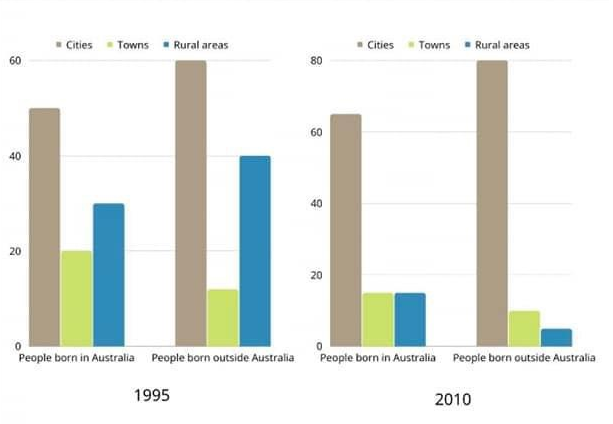[Nguyen T] Writing Practice Test 1074020
Task 1
You should spend about 20 minutes on this task.
The bar chart below describes some changes about the percentage of people were born in Australia and who were born outside Australia living in urban, rural and town between 1995 and 2010.
Summarise the information by selecting and reporting the main features and make comparisons where relevant.
You should write at least 150 words.

The chart indicates some changes in the percentage of people who were born in Australia and who were born outside Australia living in urban, rural, and towns from 1995 to 2010.
In 1975, amount of people born in Australia in the city was about 50%, however about 60% of people born outside this country's city. In town, the number of people born in Australia was bigger than the number of people born outside it, by 20%. In rural areas, the number of people born in Australia was less than the amount of people born outside it, by 40%.
However, there is a very big difference between 1995 and 2010. the number of people born in both Australia and outside it in 2010 was less than the number of people born in both Australia and outside it in 1995. Amount of people born in Australia in the city was about 45% and about 60% of people born outside this country's city like in 1995. In towns and rural areas, the number of people born in Australia was bigger than the number of people born outside it, by 16%.
Overall, the percentage of people who were born in Australia is smaller than the percentage of people who were born outside Australia living in urban, rural, and towns in 1995. And it is the same as the one in 2010.
Task 2
You should spend about 40 minutes on this task.
Rich countries often give money to poorer countries, but it does not solve poverty. Therefore, developed countries should give other types of help to the poor countries rather than financial aid. To what extent do you agree or disagree?
You should write at least 250 words.
Nowadays, rich countries usually give money to poorer countries for the purpose to help people in those countries can live normally, with no more poverty. Although it can help them out of starvation for nearly a week or even a month, after that time period, they will suddenly fall into a situation of lack of food, and money. So, I agree that developed countries should have some other measures for poor countries rather than financial aid.
First, there will be a main point about the poor country. Why are people born in those countries have a terrible life? It can be answered that because of those countries' topographic. For example, Africa is the poorest continent in the world. And the country in Africa is poor as well. A few rivers go inland making the soil dry and agriculture becomes worse. Another reason is people in that area lack work. Lack of work will make the number of unemployed increase. And it can be that poor work productivity leads to poor working efficiency.
So once again, developed countries should have some other solution to help poor countries reduce poverty rather than financial aid. Some ways that can be used to help are making more companies for the unemployed, recruiting more staff to work, and creating more jobs for employees. That will help a lot of the poor and unemployed. Also, rich countries should teach the employee about what they have to do and coach them to be the best workers possible. The better worker is, the better the country develops.
In conclusion, both poor countries and rich countries should cooperate with each other. I think that poor countries will develop successfully and enrich their countries in the future. The future won't have any poor countries and there will be more developed countries because of the technology's development.
Community’s feedback
Sorry! We couldn't find any contents.
Leaderboard:
| # | User | Score | Time | |
|---|---|---|---|---|
| Kento Nanami |  | 8.5 | 52:31 | |
| Nayef Alhajraf |  | 8.5 | 60:00 | |
| Ella Ruppo |  | 7.5 | 59:39 | |
| 4 | chengxi yu |  | 7.0 | 00:00 |
| 5 | avin chui |  | 7.0 | 59:11 |
| 6 | 癫 火 |  | 7.0 | 59:51 |
| 7 | Li Xuefeng |  | 6.5 | 03:46 |
| 8 | Chanisara Wongkongsang |  | 6.5 | 56:37 |
| 9 | Dan H |  | 6.0 | 50:41 |
| 10 | Carlo Di Giacomo |  | 6.0 | 60:00 |



